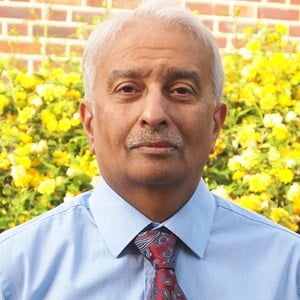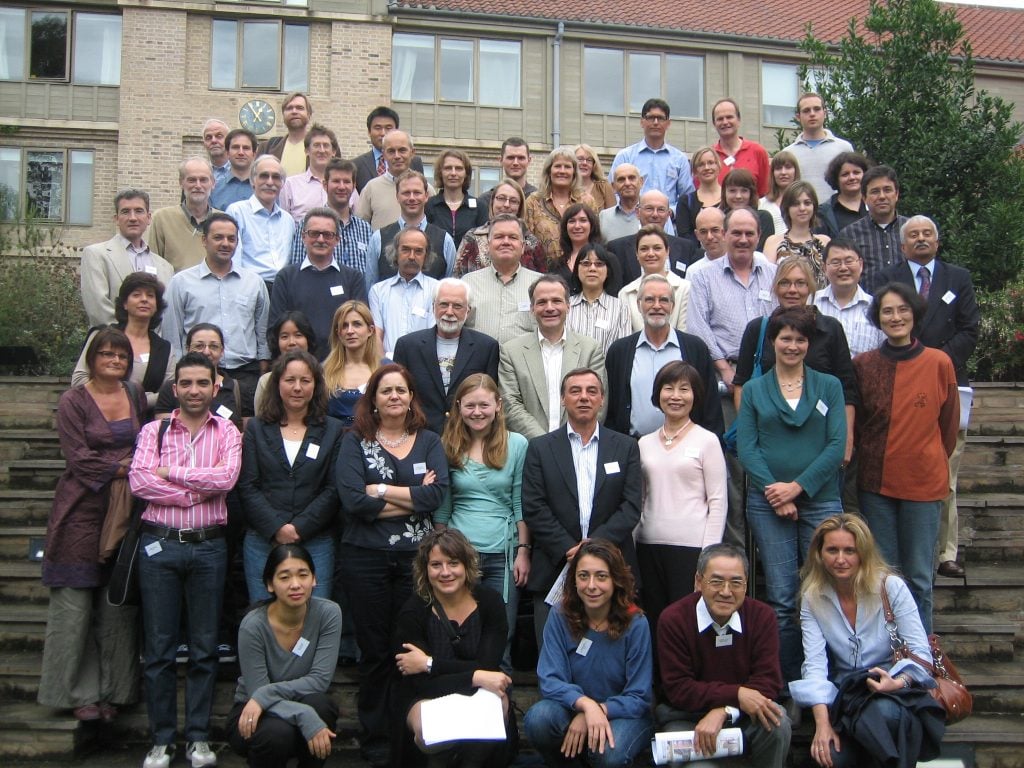
The Endocrine Society’s 2025 recipient of the Gerald D. Aurbach Award for Outstanding Translational Research, V. Krishna Chatterjee, MD, tells Endocrine News why it’s so important for clinicians and basic scientists to work together to improve human health.
In 2021, when our lives were still gripped by the deadly COVID-19 pandemic, V. Krishna Chatterjee, MD, pivoted to join U.K. researchers on the world’s first clinical trial to study the effectiveness of the booster dose of the COVID-19 vaccine. The trial was conducted at unprecedented speed — signaling hope to Chatterjee that translating discovery science into health benefits for other diseases could also be done at a faster pace.
His long list of research achievements, including his valuable contribution to the vaccine trial, led the Endocrine Society to recognize Chatterjee as the 2025 Gerald D. Aurbach Award winner for Outstanding Translational Research. The award honors outstanding contributions to research that accelerates the transition of scientific discoveries into clinical applications.
Chatterjee is a professor of endocrinology, based at the Institute of Metabolic Science in the University of Cambridge, a consultant endocrinologist at Cambridge University Hospitals, and director of the National Institute for Health Research Cambridge Clinical Research Facility in Cambridge, U.K. In 2023, he was appointed the high honor of Commander of the Order of the British Empire (CBE) for services to people with endocrine disorders.
Notable for his contribution to the molecular basis of endocrine disorders and its application to clinical medicine, Chatterjee and fellow researchers first discovered Resistance to Thyroid Hormone alpha, a rare disorder of thyroid hormone action. He and his team also identified different mutations in the PPARγ gene, causing a rare form of diabetes which is also associated with early-onset hypertension. This discovery would eventually lead to the development of new drugs to treat the condition.
Endocrine News asked Chatterjee about his renowned discoveries and what he enjoys most when he’s outside the lab.
Endocrine News: The Laureate award for Outstanding Translational Research is named in honor of Dr. Gerald Aurbach, the Society’s 68th president and a renowned researcher and clinician. What did news of the recognition mean to you?
Chatterjee: I am very honored to receive this award, which also recognizes the contributions, over many years, of both basic scientists and clinicians in my research group.
EN: You’ve been honored for your contributions that focused on genetic and molecular endocrinology, especially Resistance to Thyroid Hormone β and α as well as defective PPARγ causing a rare form of insulin-resistant diabetes and early-onset hypertension. What are your lab’s current research goals that may extend your contributions to translational science?
“It was a privilege to contribute to a [COVID-19 vaccine] trial, undertaken at unprecedented speed and scale, which informed U.K. vaccination policy immediately. Going forward, I hope this indicates that it should be possible to translate discovery science into health benefits faster in other disease areas, too.” — V. Krishna Chatterjee, MD, professor of endocrinology, Institute of Metabolic Science, University of Cambridge; consultant endocrinologist, Cambridge University Hospitals; director, National Institute for Health Research Cambridge Clinical Research Facility, Cambridge, U.K.
Chatterjee: Having found that patients with Resistance to Thyroid Hormone β are at increased risk of atrial fibrillation, major cardiovascular events, and earlier mortality, we wish to develop interventions that address this unmet need in the disorder. We wish to determine whether thyroid hormone therapy in Resistance to Thyroid Hormone α, including treatment of patients identified at birth, can prevent adverse health outcomes.
EN: How many scientists are currently on your lab team and what do you enjoy most about collaborations in the research lab?
Chatterjee: My current research team includes two basic scientists and a clinical health professional. I continue to collaborate with both clinicians and basic scientists around the world. My past collaborations with basic scientists have sometimes yielded our most fulfilling contributions to knowledge and understanding.
EN: You were a contributor to the world’s first clinical trial that studied the effectiveness of the booster dose of COVID-19 vaccine. I vividly recall anxiously waiting until the third dose became available. When you look back on the early months of the pandemic, did you think we’d get to where we are now?
Chatterjee: It was a privilege to contribute to a trial, undertaken at unprecedented speed and scale, which informed U.K. vaccination policy immediately. Going forward, I hope this indicates that it should be possible to translate discovery science into health benefits faster in other disease areas, too.
EN: When you are not in the lab, what is your favorite way to pass the time?
Chatterjee: As a keen supporter of Arsenal, I am happy to see the good times again at this football club. We may even win the league…someday soon!

In his Laureate Award citation, J. Larry Jameson, MD, PhD, interim president of the University of Pennsylvania, who previously served as the inaugural editor-in-chief of the Journal of the Endocrine Society, praised Chatterjee for his important discoveries in the clinical understanding of Resistance to Thyroid Hormone, delineating cardiac hyperthyroidism, dyslipidaemia, and hepatic steatosis and increased cardiovascular morbidity and mortality in RTHβ.
“He has shown that RTHα is a form of congenital hypothyroidism associated with near-normal thyroid function tests, which is underdiagnosed,” Jameson wrote. “His observation that thyroxine therapy can prevent many adverse consequences of RTHα, highlights a need for increased, future ascertainment of this condition.”
Jameson added that Chatterjee has translated his research into biochemical and genetic tests and biomarkers that constitute an internationally recognized diagnostic service for disorders of thyroid hormone action, and which inform therapeutic approaches (e.g., selective thyromimetics) in these disorders. “His research, which spans the basic-clinical interface, is an exemplar of translational investigative science,” he concluded.
ENDO 2025 attendees in San Francisco, Calif., will get the chance to meet Chatterjee — and the other 2025 Laureate Award recipients — when he is presented the Aurbach Award for Outstanding Translational Research. ENDO 2025 takes place July 12 – 15, 2025.
Shaw is a freelance writer based in Carmel, Ind. She is a regular contributor to Endocrine News and writes the monthly Lab Notes column.

